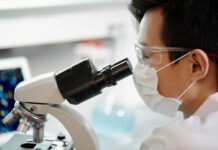“Up until the time I finished high school, we were still largely thinking about life on this planet as being entirely dependent on the sun’s energy. But around the time of the late 1970s, we began to understand that there are other forms of life as well.”
Geochemist Barbara Sherwood Lollar is well-known for her work looking for life in unlikely places. Not only does her work have implications for life in outer space, but also for describing newly uncovered life forms here on Earth. Sherwood Lollar is a university professor of Earth sciences at the University of Toronto, and she’s part of a field of research that changed what we know about the requirements for life.
Most of the life forms we’re most familiar with draw energy for life from photosynthesis. Plants, and some microorganisms, draw their energy from the sun, and this energy moves up the food chain.
But deep underground and deep in the ocean, there are many microbes that don’t need the sun to survive at all. They derive their energy from chemosynthesis: the energy of chemistry as water reacts with rocks and minerals.
“Even the continents, and even deep in the crystalline rock that forms the core of the continents around the world, there’s still energy that can sustain microbial life,” says Sherwood Lollar. “We’re looking at the way in which naturally-occurring microorganisms are living in the waters deep within this planet.”
One of the fascinating things about the diversity of microbial life on Earth is that each microbe can carry out unique chemistry, simply as a part of their everyday lives. These biological processes can be exploited for environmental applications.
“I study contaminants in water,” adds Ann Sullivan Ojeda, postdoctoral fellow at the University of Toronto.
“A lot of processes put contaminants in the water. But what’s great about our environment, a lot of the microbes that are already in the soils can eat these contaminants and by the time they get to the water, they are not harmful at all. We’re interested in identifying those microbes because we want to promote them so that they can transform toxic organic compounds into non-toxic compounds.”
For Sherwood Lollar, this combination of biology and geochemistry lets her use the tools she loves to answer fundamentally human questions.
“(In this discipline) there are both very practical and very applied implications to our interactions with each other and society, and to our interaction with the planet in terms of, for instance, water, resources, and climate,” says Sherwood Lollar.
“These are questions in Earth sciences that are very, very close to the nature of who we are as human beings, how we interact with our environment, and where we came from.”








































